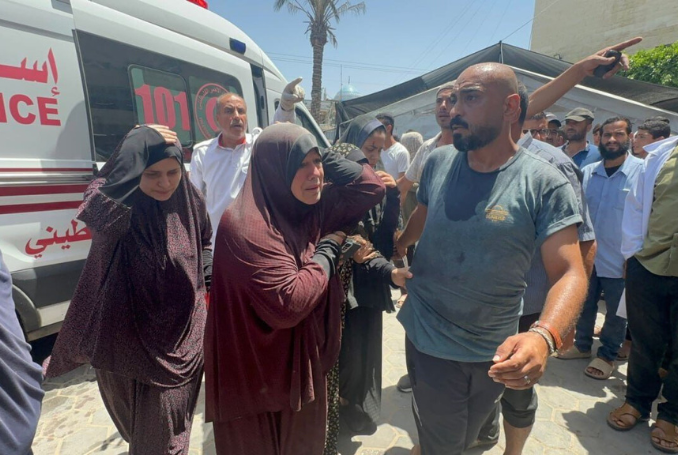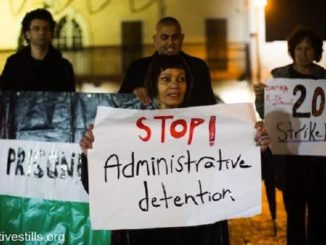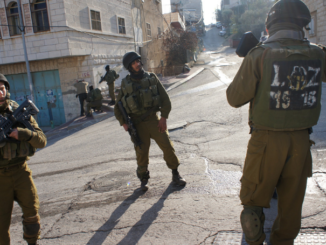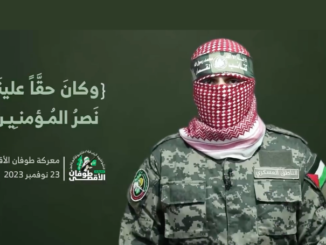
“Lack of fuel has forced nine bakeries that were working at partial capacity to completely cease their operations.”
Active hostilities, damaged roads and access limitations are among the factors contributing to a critical shortage of fuel and humanitarian aid in the besieged Gaza Strip, according to the UN’s Office for the Coordination of Humanitarian Affairs.
The Office reports that “active hostilities, damaged roads, access limitations and the lack of public order and safety continue to hamper movement along the main humanitarian cargo route from the Kerem Shalom Crossing to Khan Younis and then on to Deir al Balah,” said UN spokesperson Stephane Dujarric during a press briefing on Monday.
“This has resulted in critical shortages of fuel and aid to sustain humanitarian operations,” he added.
Dujarric also warned that the situation is “increasing the risk that stranded supplies – especially food – will spoil in the very hot summer heat.”
Bakeries Unable to Operate
Humanitarian partners, he pointed out, have said that these shortages forced them to reduce food rations in central and southern Gaza last month, undermining their ability to keep bakeries and community kitchens up and running.
“Just three of the 18 bakeries that our humanitarian colleagues support in Gaza are still operational, all of them in Deir al Balah,” the spokesman emphasized. “Meanwhile, lack of fuel has forced nine bakeries that were working at partial capacity to completely cease their operations.”
‘Impossible Choices’ – WHO Warns Lack of Fuel ‘Catastrophic’ for Gaza Hospitals
He also pointed out that the neighborhoods affected by the new evacuation orders in Gaza City “are home to more than 60 shelters that had been schools, as well as 2 partially functional hospitals, 6 medical points and 2 primary health-care centers.”
Staff and patients have reportedly left hospitals in and around the areas that were designated for evacuation, the spokesman pointed out.
Lebanon-Israel Conflict
Dujarric also reported that the UN Special Coordinator for Lebanon, Jeanine Hennis-Plasschaert, arrived in Israel on Sunday for a three-day visit, ahead of the planned UN Security Council consultations on the implementation of Security Council resolution 1701(2006).
“Discussions with Israeli officials are expected to focus on the need to restore calm and give space for a diplomatic resolution that enables displaced civilians on both sides to return home,” he said.
Since assuming office last month, the Special Coordinator “has extensively engaged the Lebanese leadership and key interlocutors on ways to deescalate tensions across the Blue Line,” the spokesperson added.
Over 38,000 Killed
Currently on trial before the International Court of Justice for genocide against Palestinians, Israel has been waging a devastating war on Gaza since October 7.
According to Gaza’s Ministry of Health, 38,193 Palestinians have been killed, and 87,903 wounded. Moreover, at least 11,000 people are unaccounted for, presumed dead under the rubble of their homes throughout the Strip.
Israel says that 1,200 soldiers and civilians were killed during the Al-Aqsa Flood Operation on October 7. Israeli media published reports suggesting that many Israelis were killed on that day by ‘friendly fire’.
Palestinian and international organizations say that the majority of those killed and wounded are women and children.
The Israeli war has resulted in an acute famine, mostly in northern Gaza, resulting in the death of many Palestinians, mostly children.
The Israeli aggression has also resulted in the forceful displacement of nearly two million people from all over the Gaza Strip, with the vast majority of the displaced forced into the densely crowded southern city of Rafah near the border with Egypt – in what has become Palestine’s largest mass exodus since the 1948 Nakba.
Later in the war, hundreds of thousands of Palestinians began moving from the south to central Gaza in a constant search for safety.
(The Palestine Chronicle)









